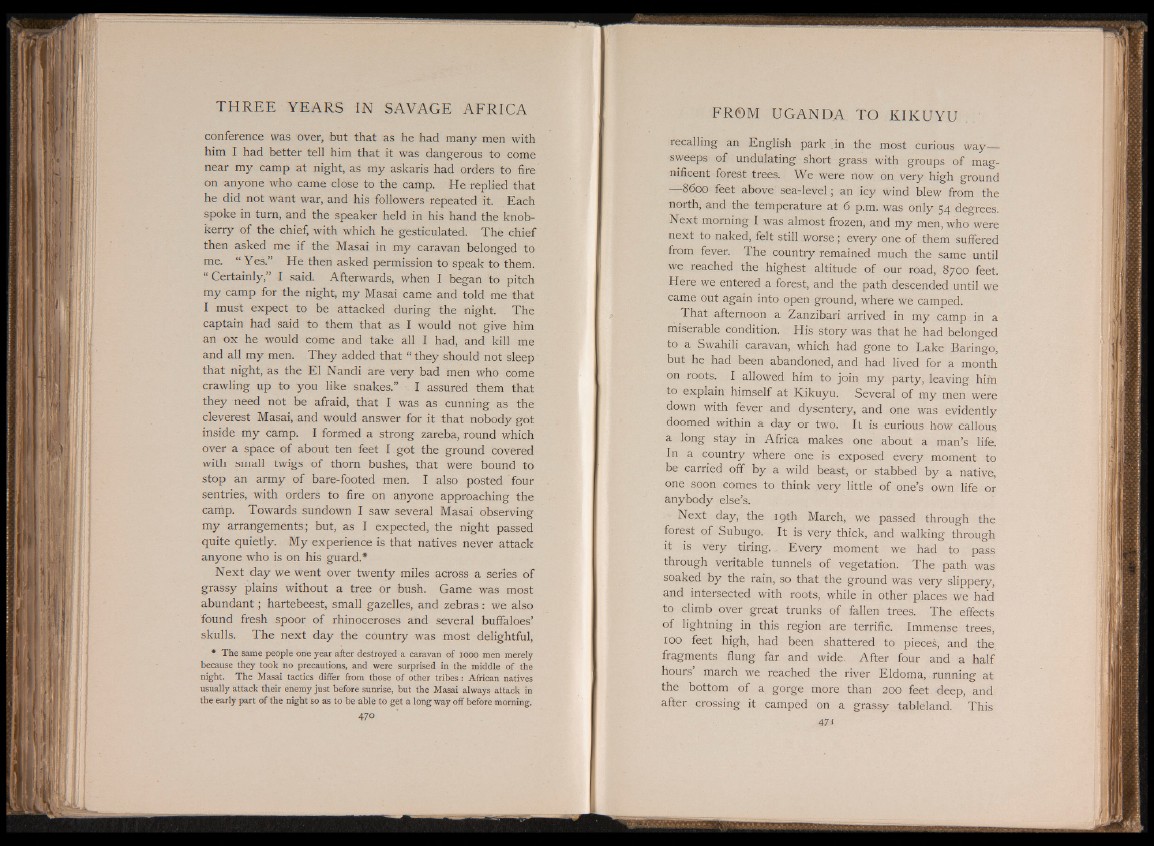
conference was over, but that as he had many men with
him I had better tell him that it was dangerous to come
near my camp at night, as my askaris had orders to fire
on anyone who came close to the camp. He replied that
he did not want war, and his followers repeated it. Each
spoke in turn, and the speaker held in his hand the knob-
kerry of the chief, with which he gesticulated. The chief
then asked me if the Masai in my caravan belonged to
me. “ Yes.” He then asked permission to speak to them.
“ Certainly,” I said. Afterwards, when I began to pitch
my camp for the night, my Masai came and told me that
I must expect to be attacked during the night. The
captain had said to them that as I would not give him
an ox he would come and take all I had, and kill me
and all my men. They added that “ they should not sleep
that night, as the El Nandi are very bad men who come
crawling up to you like snakes.” I assured them that
they need not be afraid, that I was as cunning as the
cleverest Masai, and would answer for it that nobody got
inside my camp. I formed a strong zareba, round which
over a space of about ten feet I got the ground covered
with small twigs of thorn bushes, that were bound to
stop an army of bare-footed men. I also posted four
sentries, with orders to fire on anyone approaching the
camp. Towards sundown I saw several Masai observing
my arrangements; but, as I expected, the night passed
quite quietly. My experience is that natives never attack
anyone who is on his guard.*
Next day we went over twenty miles across a series of
grassy plains without a tree or bush. Game was most
abundant; hartebeest, small gazelles, and zebras: we also
found fresh spoor of rhinoceroses and several buffaloes’
skulls. The next day the country was most delightful,
* The same people one year after destroyed a caravan of iooo men merely
because they took no precautions, and were surprised in the middle of the
night. The Masai tactics differ from those of other tribes: African natives
usually attack their enemy just before sunrise, but the Masai always attack in
the early part of the night so as to be able to get a long way off before morning.
470
recalling an English park .in the most curious way__
sweeps of undulating short grass with groups of magnificent
forest trees. We were now on very high ground
8600 feet above sea-level; an icy wind blew from the
north, and the temperature at 6 p.m. was only 54 degrees.
Next morning I was almost frozen, and my men, who were
next to naked, felt still worse; every one of them suffered
from fever. The country remained much the same until
we reached the highest altitude of our road, 8700 feet.
Here we entered a forest, and the path descended until we
came out again into open ground, where we camped.
That afternoon a Zanzibari arrived in my camp in a
miserable condition. His story was that he had belonged
to a Swahili caravan, which had gone to Lake Baringo,
but he had been abandoned, and had lived for a month
on roots. I allowed him to join my party, leaving him
to explain himself at Kikuyu. Several of my men were
down with fever and dysentery, and one was evidently
doomed within a day or two. It is curious how callous,
a long stay in Africa makes one about a man’s life.
In a country where one is exposed every moment to
be carried off by a wild beast, or stabbed by a native,
one soon comes to think very little of one’s own life or
anybody else’s.
Next day, the 19th March, we passed through the
forest of Subugo. It is very thick, and walking through
it is very tiring. Every moment we had to pass
through veritable tunnels of vegetation. The path was
soaked by the rain, so that the ground was very slippery,
and intersected with roots, while in other places we had
to climb over great trunks of fallen trees. The effects
of lightning in this region are terrific. Immense trees,
100 feet high, had been shattered to pieces, and the
fragments flung far and wide. After four and a half
hours march we reached the river Eldoma, running at
the bottom of a gorge more than 200 feet deep, and
after crossing it camped on a grassy tableland. This
471